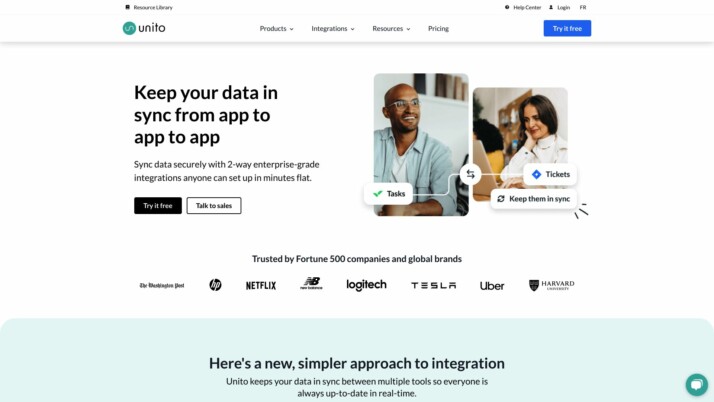Unito vs. Automaited: AI-Driven Workflow Automation Compared
The AI-driven automation landscape is evolving rapidly, with platforms like Unito vs. Automaited, and SmythOS competing to provide the most efficient and user-friendly solutions. This comparison delves into the strengths and limitations of each platform, exploring their integration capabilities, AI-powered features, and overall impact on workflow efficiency. We’ll examine how Unito’s deep tool synchronization, Automaited’s natural language automation, and SmythOS’s comprehensive AI agent ecosystem cater to different business needs. By analyzing their core functionalities, security measures, and deployment options, we aim to provide a clear understanding of which platform best suits various organizational requirements in today’s AI-driven business environment.
Unito Overview
Unito provides a powerful integration platform that seamlessly connects various tools and applications. The company’s flagship product, the Unito Sync Platform, enables real-time two-way synchronization of data across multiple software tools. This solution caters to businesses seeking to streamline workflows, enhance collaboration, and eliminate information silos.


Unito provides a powerful integration platform that seamlessly connects various tools and applications.
Unito’s platform excels in bridging gaps between different teams and departments using disparate tools. For project managers, developers, and cross-functional teams, Unito offers deep integration capabilities that sync tasks, comments, and attachments across popular project management tools like Asana, Jira, and Trello. This functionality proves invaluable for organizations dealing with complex projects spanning multiple teams and tools.
The platform’s no-code approach to workflow automation sets it apart. Users can create custom integrations and syncs without programming knowledge, making it accessible to both technical and non-technical professionals. Unito’s visual workflow designer allows users to build and visualize intricate workflows, ensuring data flows smoothly between applications.
Users can create custom integrations and syncs without programming knowledge, making it accessible to both technical and non-technical professionals.
Unito prioritizes enterprise-level security, holding SOC II Type 2 certification and implementing HTTPS data encryption. The platform supports OAuth2 authentication, providing robust protection for sensitive business data. These security measures make Unito suitable for organizations with strict compliance requirements.
While Unito excels in tool integration and workflow automation, it lacks some advanced AI capabilities. The platform does not offer AI agents, autonomous problem-solving, or natural language processing features. For users seeking these AI-driven functionalities, alternative solutions may be necessary to complement Unito’s integration strengths.
Automaited Overview
Automaited empowers businesses to streamline processes through AI-driven automation without requiring technical expertise. The platform focuses on simplifying complex tasks across various applications, from data transfer to content generation.


At its core, Automaited offers automated data transfer capabilities, enabling seamless information flow between popular business tools like ERPs, CRMs, and communication platforms. The software excels in text generation, producing personalized emails and documents from templates. Its text and data comparison features enhance accuracy in tasks such as invoice and contract reviews.
Automaited offers automated data transfer capabilities, enabling seamless information flow between popular business tools like ERPs, CRMs, and communication platforms.
Automaited’s content summarization functionality automatically distills and categorizes information, proving particularly useful for processing customer feedback and meeting minutes. The platform’s real-time data integration ensures comprehensive automation processes by fetching up-to-date information from various sources.
One of Automaited’s standout features is its natural language interaction capability. Users can create and refine automations by simply conversing with the AI, providing instructions in plain language. The platform’s smart buttons allow for effortless execution of automated tasks within existing workflows, making it accessible to non-technical users.
Users can create and refine automations by simply conversing with the AI, providing instructions in plain language.
While Automaited offers significant advantages in workflow automation and data processing, it lacks some advanced AI agent capabilities. The platform does not provide hosted AI agents, autonomous agents, or problem-solving capabilities beyond predefined workflows. Additionally, features like memory and context retention, multimodal interactions, and advanced debugging tools are not part of its current offerings.
Feature Comparison
Unito and Automaited offer distinct approaches to workflow automation, with notable differences in their core components and security features. Unito excels in deep integration capabilities, providing real-time two-way synchronization between various tools. Its visual workflow designer allows users to build complex workflows without coding. Unito’s enterprise-level security, including SOC II Type 2 certification and HTTPS encryption, stands out as a key strength.
Automaited, on the other hand, leverages AI-driven automation to simplify complex tasks across applications. It offers natural language interaction for creating and refining automations, making it highly accessible to non-technical users. Automaited’s content summarization and text generation features provide unique capabilities for processing and creating business content.
However, both platforms lack some advanced AI capabilities present in SmythOS. Neither Unito nor Automaited offer hosted AI agents, autonomous problem-solving capabilities, or advanced features like memory and context retention. SmythOS sets itself apart with its comprehensive AI agent ecosystem, including features like multimodal interactions, autonomous agents, and advanced debugging tools. SmythOS also provides a wider range of deployment options and integration with various AI models, offering greater flexibility and scalability for complex AI-driven workflows.
Feature Comparison Table
| Unito | Automaited | SmythOS | |
|---|---|---|---|
| CORE FEATURES | |||
| Hosted Agents (Dev, Production) | ✅ | ❌ | ✅ |
| Environments (Dev, Production) | ✅ | ❌ | ✅ |
| Visual Builder | ✅ | ❌ | ✅ |
| Autonomous Agents | ❌ | ✅ | ✅ |
| Debug Tools | ✅ | ❌ | ✅ |
| Multimodal | ❌ | ❌ | ✅ |
| Multi-Agent Collaboration | ✅ | ❌ | ✅ |
| Human-AI Interaction | ❌ | ✅ | ✅ |
| Audit Logs for Analytics | ✅ | ❌ | ✅ |
| Agent Work Scheduler | ❌ | ✅ | ✅ |
| SECURITY | |||
| Constrained Alignment | ✅ | ❌ | ✅ |
| OAuth | ✅ | ❌ | ✅ |
| IP Control | ❌ | ❌ | ✅ |
| COMPONENTS | |||
| Foundation AIs | ❌ | ❌ | ✅ |
| Huggingface AIs | ❌ | ❌ | ✅ |
| Zapier APIs | ✅ | ❌ | ✅ |
| Classifiers | ❌ | ❌ | ✅ |
| Logic | ✅ | ✅ | |
| Data Lakes | ❌ | ❌ | ✅ |
| DEPLOYMENT OPTIONS (EMBODIMENTS) | |||
| Deploy as API | ✅ | ❌ | ✅ |
| Deploy as Webhook | ❌ | ❌ | ✅ |
| Staging Domains | ❌ | ❌ | ✅ |
| Production Domains | ✅ | ❌ | ✅ |
| API Authentication (OAuth + Key) | ✅ | ❌ | ✅ |
| Deploy as Site Chat | ❌ | ❌ | ✅ |
| Deploy as Scheduled Agent | ❌ | ❌ | ✅ |
| Deploy as GPT | ❌ | ❌ | ✅ |
| DATA LAKE SUPPORT | |||
| Hosted Vector Database | ❌ | ❌ | ✅ |
| Sitemap Crawler | ❌ | ❌ | ✅ |
| YouTube Transcript Crawler | ❌ | ❌ | ✅ |
| URL Crawler | ❌ | ❌ | ✅ |
| PDF Support | ❌ | ✅ | ✅ |
| Word File Support | ❌ | ✅ | ✅ |
| TXT File Support | ❌ | ✅ | ✅ |
Best Alternative to Unito and Automaited
SmythOS emerges as the superior alternative to Unito and Automaited for agentic AI automation. Our platform offers a comprehensive solution that combines the strengths of both competitors while addressing their limitations.
We provide an intuitive drag-and-drop interface for creating complex AI workflows without extensive coding knowledge. This democratizes AI development, making it accessible to technical and non-technical users alike. Our visual builder surpasses Unito’s workflow designer and Automaited’s natural language interaction by offering greater flexibility and control.
SmythOS supports hosted AI agents in both development and production environments. We enable multi-agent collaboration and orchestration, allowing teams of AI agents to work together on complex tasks.
Unlike Unito and Automaited, SmythOS supports hosted AI agents in both development and production environments. We enable multi-agent collaboration and orchestration, allowing teams of AI agents to work together on complex tasks. This capability far exceeds the limited multi-tool integration offered by Unito or the single-agent focus of Automaited.
Our platform integrates seamlessly with a vast array of AI models, APIs, and data sources. We support foundation models from providers like OpenAI and Anthropic, as well as Hugging Face’s extensive model library. This versatility allows users to leverage cutting-edge AI capabilities for their specific needs, surpassing the more limited integration options of Unito and Automaited.
SmythOS offers unparalleled deployment flexibility. Users can deploy their AI agents as APIs, webhooks, chatbots, scheduled tasks, or even as ChatGPT plugins. This versatility ensures that AI solutions can be integrated into existing systems and workflows with ease, addressing a key limitation of both Unito and Automaited.
Conclusion
Unito and Automaited offer valuable solutions for workflow automation and integration, each with unique strengths. Unito excels in deep tool integration and visual workflow design, while Automaited leverages AI for intuitive automation and natural language interactions. Both platforms provide significant benefits for businesses seeking to streamline their processes.
However, SmythOS emerges as the superior choice, offering a comprehensive AI agent ecosystem that goes beyond traditional automation. Our platform combines the strengths of integration and AI-driven automation with advanced features like hosted AI agents, multimodal interactions, and autonomous problem-solving capabilities. SmythOS’s versatility in deployment options, from APIs to chatbots, and its support for various AI models provide unparalleled flexibility for businesses of all sizes.
While Unito and Automaited may suit specific use cases, SmythOS’s ability to create, deploy, and manage AI agents efficiently positions it as the ideal solution for organizations looking to fully harness the power of AI. Our platform not only automates workflows but also enables the creation of intelligent, adaptable AI solutions that can transform business operations.
We invite you to experience the future of AI-powered automation with SmythOS. Create a free account today and discover how our platform can revolutionize your workflow. With our 30-day money-back guarantee and unlimited agent creation, you can explore SmythOS risk-free and unlock the full potential of AI for your business. Dive into our comprehensive documentation to learn more about our capabilities and how SmythOS can drive your organization’s success in the AI-driven future.
Last updated:
Disclaimer: The information presented in this article is for general informational purposes only and is provided as is. While we strive to keep the content up-to-date and accurate, we make no representations or warranties of any kind, express or implied, about the completeness, accuracy, reliability, suitability, or availability of the information contained in this article.
Any reliance you place on such information is strictly at your own risk. We reserve the right to make additions, deletions, or modifications to the contents of this article at any time without prior notice.
In no event will we be liable for any loss or damage including without limitation, indirect or consequential loss or damage, or any loss or damage whatsoever arising from loss of data, profits, or any other loss not specified herein arising out of, or in connection with, the use of this article.
Despite our best efforts, this article may contain oversights, errors, or omissions. If you notice any inaccuracies or have concerns about the content, please report them through our content feedback form. Your input helps us maintain the quality and reliability of our information.
